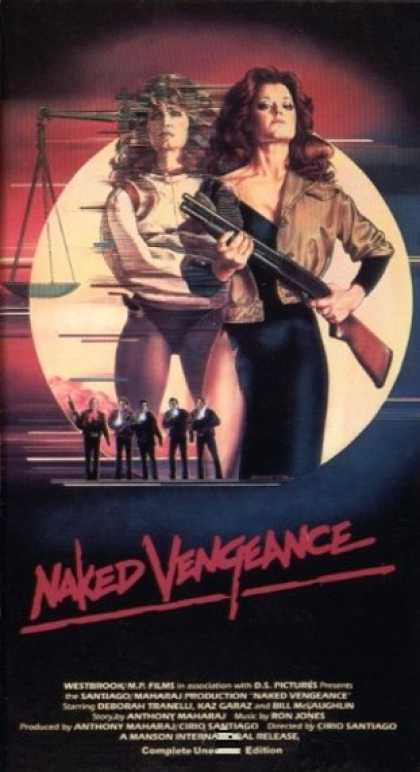★★★
“A taste of anti-paradise”
 Somehow, I get the feeling I should have liked this more than I did. The elements are all these – high-energy, hyper-violence and no shortage of style – but, somehow, the whole felt rather less than the sum of its parts. It’s a post-apocalyptic scenario, after the corporate wars have pretty much trashed the planet, and the Council of Nine hand out rewards for the deaths of white-collar criminals. These are collected by the titular hunters, the best being Drifter (Marsden) and Mary Death (Pitre) – the latter is a star, followed by fans and paparazzi, much to the chagrin of the former. However, the Council suddenly issue a kill notice for Drifter; he heads to confront them and sort out the “mistake”, with Mary in hot pursuit, intent on collecting the bounty. Of course, and after quite a bit of the old ultra-violence, Drifter and Mary team up, to take down the real bad guys.
Somehow, I get the feeling I should have liked this more than I did. The elements are all these – high-energy, hyper-violence and no shortage of style – but, somehow, the whole felt rather less than the sum of its parts. It’s a post-apocalyptic scenario, after the corporate wars have pretty much trashed the planet, and the Council of Nine hand out rewards for the deaths of white-collar criminals. These are collected by the titular hunters, the best being Drifter (Marsden) and Mary Death (Pitre) – the latter is a star, followed by fans and paparazzi, much to the chagrin of the former. However, the Council suddenly issue a kill notice for Drifter; he heads to confront them and sort out the “mistake”, with Mary in hot pursuit, intent on collecting the bounty. Of course, and after quite a bit of the old ultra-violence, Drifter and Mary team up, to take down the real bad guys.
An adaptation of a graphic novel, it does, at least, a better job of capturing the grindhouse philosophy than the limp Machete Kills. The inspiration – actually, it’s more shameless plagiarism – is more Mad Max 2, particularly in its stubbly hero and an extended chase sequence across the desert, in which he’s chased by a pack of nomads with painted faces. That’s perhaps the problem, because Drifter was a great deal less interesting than Mary Death to me; Marsden delivers a bland performance, over so much screen-time that this almost didn’t meet the necessary minimum standards for GWG qualification. I could also have done without the embarrassingly blunt attempts at “satire”, which feel like they came from an earnest late-night session at a liberal arts college. It’s not clever and it’s not funny.
But the bits that work, work quite nicely. There’s a great scene where Drifter is being yelled at in a soundproof office by the lead villainess (Loken), who is oblivious to the mayhem being wreaked by Mary on the other side of the glass. Indeed, virtually every time Ms. Death is on screen, the interest level increases significantly, and not merely for the obvious reasons. Pitre struts, stomps and raised the sardonic eyebrow to such impressive effect, that you wonder why you’ve never heard of her before. If Drifter is reheated leftovers of every post-apocalypse hero from the past 20 years, Death gives us something new. Hopefully, if there’s any sequel, Marsden will be “unavailable”, and the makers can concentrate much more on the heroine.
Dir: Henry Saine
Star: Matthew Marsden, Christian Pitre, Barak Hardle, Kristanna Loken







 Surely one of the great B-movie exploitation titles of all-time, this inevitably can’t live up to the expectations that generates, though in the early going, it makes a half-decent effort. Certainly, it’s more entertaining than Guzman’s previous Run! Bitch Run!, though it does suffer from some of the same mean-spirited unpleasantness. The heroine is Sister Sarah (Ortega), who has been a long-term victim of the Catholic Church, which is portrayed here as the embodiment of just about every evil imaginable, being neck-deep in drugs, prositution and other equally-dubious activities, with their partners, the Los Muertos biker gang. Finally, Sarah has a vision from God, telling her it’s time to clean house: she starts at the bottom, and works her way up to Chavo (Castro) and Father Carlittos (D’Marco). Along the way, yes, there is no shortage of nude nuns – or other women – though, to be honest, the guns aren’t actually all
Surely one of the great B-movie exploitation titles of all-time, this inevitably can’t live up to the expectations that generates, though in the early going, it makes a half-decent effort. Certainly, it’s more entertaining than Guzman’s previous Run! Bitch Run!, though it does suffer from some of the same mean-spirited unpleasantness. The heroine is Sister Sarah (Ortega), who has been a long-term victim of the Catholic Church, which is portrayed here as the embodiment of just about every evil imaginable, being neck-deep in drugs, prositution and other equally-dubious activities, with their partners, the Los Muertos biker gang. Finally, Sarah has a vision from God, telling her it’s time to clean house: she starts at the bottom, and works her way up to Chavo (Castro) and Father Carlittos (D’Marco). Along the way, yes, there is no shortage of nude nuns – or other women – though, to be honest, the guns aren’t actually all  If the first Queen Bee movie was a fairly effective romp through the genre, that’s a lot less the case fot the follow-up, with Ike largely floundering around, as Maki, the leader of the Pearl Gang, who finds herself embroiled in a battle with another crew, the Black Lilies and their leader, Yuri (Kazama). Their spat is interrupted, when the Kuroji clan of yakuza throw their weight behind the Black Lilies. However, the triumph of the Lilies is short-lived, as they find out that they are about to be forced into life as prostitutes, for the benefit of their new allies, ending their life of freedom in the ‘hood. There are also subplots in which Yuri’s former boyfriend, Eizo wants to be a top racing driver, bringing him into conflict with the yakuza as well, and a suitcase filled with stolen guns.
If the first Queen Bee movie was a fairly effective romp through the genre, that’s a lot less the case fot the follow-up, with Ike largely floundering around, as Maki, the leader of the Pearl Gang, who finds herself embroiled in a battle with another crew, the Black Lilies and their leader, Yuri (Kazama). Their spat is interrupted, when the Kuroji clan of yakuza throw their weight behind the Black Lilies. However, the triumph of the Lilies is short-lived, as they find out that they are about to be forced into life as prostitutes, for the benefit of their new allies, ending their life of freedom in the ‘hood. There are also subplots in which Yuri’s former boyfriend, Eizo wants to be a top racing driver, bringing him into conflict with the yakuza as well, and a suitcase filled with stolen guns. This was also released in a hardcore version as Black Lolita, but I’m not sure if that was 3D or not. Certainly, the DVD delivers about the worst such attempt I’ve ever seen. It’s in color, but also attempts the red/green method (glasses very early, and the only thing to be said for them is, they stop you seeing the film, which on the whole, is probably no bad thing. Lolita (Love) decides to team up with an air-stewardess and a yoga instructress to take down the local Mr. Big, who goes by the name Buddha – even though about all he shares with the Enlightened One is being Asian, since he’s neither fat nor pacifist.
This was also released in a hardcore version as Black Lolita, but I’m not sure if that was 3D or not. Certainly, the DVD delivers about the worst such attempt I’ve ever seen. It’s in color, but also attempts the red/green method (glasses very early, and the only thing to be said for them is, they stop you seeing the film, which on the whole, is probably no bad thing. Lolita (Love) decides to team up with an air-stewardess and a yoga instructress to take down the local Mr. Big, who goes by the name Buddha – even though about all he shares with the Enlightened One is being Asian, since he’s neither fat nor pacifist. Reiko (Ike) is leader of the Athens Gang, a low-level all-girl gang, who specialize in car thefts and rolling naive salarymen with the lure of hot sex. They’re part of a hierarchy, which includes a male gang under whom they loosely operate, who are in turn on the fringes of a Yakuza group. There’s also a motor-cycle gang and its leader (Taki) who don’t obey anyone, and that independence is really what Reiko wants, even though her group is obliged to follow certain rules, such as not getting attached to any man. Things are disrupted by the return of former leader Jun (Kagawa) from reform school: will Reiko be able to hold on to her position? It’s just one of a large number of plot threads here: you also get the blackmail of a pop star; a hitman agreeing to one last mission; a gangster estranged from his wife and daughter; sex on motorcycles for no apparent reason; a journalist with a nose for scandal; and, of course Reiko failing to follow her own rule about no attachments.
Reiko (Ike) is leader of the Athens Gang, a low-level all-girl gang, who specialize in car thefts and rolling naive salarymen with the lure of hot sex. They’re part of a hierarchy, which includes a male gang under whom they loosely operate, who are in turn on the fringes of a Yakuza group. There’s also a motor-cycle gang and its leader (Taki) who don’t obey anyone, and that independence is really what Reiko wants, even though her group is obliged to follow certain rules, such as not getting attached to any man. Things are disrupted by the return of former leader Jun (Kagawa) from reform school: will Reiko be able to hold on to her position? It’s just one of a large number of plot threads here: you also get the blackmail of a pop star; a hitman agreeing to one last mission; a gangster estranged from his wife and daughter; sex on motorcycles for no apparent reason; a journalist with a nose for scandal; and, of course Reiko failing to follow her own rule about no attachments. Shae (Panabaker) is not having the best luck with men. Her older boyfriend just dumped her, to try to get back with his wife, and a night where she drinks to forget ends up with her being raped in the stairwell of her apartment building. Fortunately, there to lend a helping hand is Lu (LaLiberte), a barmaid who turns out to have a dark side. A really dark side. As in, when Shae is reporting her rape. Lu takes the desk sergeant to a motel, handcuffs to the bed, sticks a gun into his crotch and pulls the trigger. When the authorities prove about as useful as they usually are in this situation, Lu helps Shae take revenge on the bastard who raped her. Then his friends. Then the ex-boyfriend. But when Shae finds a guy who might actually not be a total douche-bag, Lu is still thoroughly unimpressed.
Shae (Panabaker) is not having the best luck with men. Her older boyfriend just dumped her, to try to get back with his wife, and a night where she drinks to forget ends up with her being raped in the stairwell of her apartment building. Fortunately, there to lend a helping hand is Lu (LaLiberte), a barmaid who turns out to have a dark side. A really dark side. As in, when Shae is reporting her rape. Lu takes the desk sergeant to a motel, handcuffs to the bed, sticks a gun into his crotch and pulls the trigger. When the authorities prove about as useful as they usually are in this situation, Lu helps Shae take revenge on the bastard who raped her. Then his friends. Then the ex-boyfriend. But when Shae finds a guy who might actually not be a total douche-bag, Lu is still thoroughly unimpressed. This starts with a memorable sequence in which Inoshika Ocho (Ike) fights off a number of attackers, armed only with her umbrella; albeit, an umbrella that is rather more heavily-armed than most. While she succeeds, she ends up losing all of her clothes in the process, leading to some artful staging in which the discarded umbrella is used to hide her naughties bits. Unfortunately, the rest of the film, while occasionally reaching the same levels of unsanity is largely crude and unpleasant. Even the central concept – a gang smuggling drugs in the vaginas of junkies – falls firmly into that category.
This starts with a memorable sequence in which Inoshika Ocho (Ike) fights off a number of attackers, armed only with her umbrella; albeit, an umbrella that is rather more heavily-armed than most. While she succeeds, she ends up losing all of her clothes in the process, leading to some artful staging in which the discarded umbrella is used to hide her naughties bits. Unfortunately, the rest of the film, while occasionally reaching the same levels of unsanity is largely crude and unpleasant. Even the central concept – a gang smuggling drugs in the vaginas of junkies – falls firmly into that category. Serial escaper Ruriko (Sugimoto) is more persistent than good, and is dragged back to reform school after her seventh escape attempt ends the same way as her previous six. After whizzing through most of the standards of the women-in-prison genre in about 30 minutes or so e.g. corrupt staff, gratuitous nudity, solitary confinement, etc. she and a few of her colleagues (supposedly teenagers, but that clearly ain’t the case) break out as a group. Splitting up to avoid detection, they arrange a rendezvous at a deserted building by the sea, from where they plan to hijack a ship and escape Japan for good. Truth be told, a sense of urgency isn’t exactly top of the their skill-set, and as they meander their way there, various escapades happen, of which the only significant one is Ruriko meeting, by chance, a male criminal (Watase), who is also trying to out-run the law. But the police are also keen to ensure that they run their record in terms of Ruriko to a perfect 8-for-8…
Serial escaper Ruriko (Sugimoto) is more persistent than good, and is dragged back to reform school after her seventh escape attempt ends the same way as her previous six. After whizzing through most of the standards of the women-in-prison genre in about 30 minutes or so e.g. corrupt staff, gratuitous nudity, solitary confinement, etc. she and a few of her colleagues (supposedly teenagers, but that clearly ain’t the case) break out as a group. Splitting up to avoid detection, they arrange a rendezvous at a deserted building by the sea, from where they plan to hijack a ship and escape Japan for good. Truth be told, a sense of urgency isn’t exactly top of the their skill-set, and as they meander their way there, various escapades happen, of which the only significant one is Ruriko meeting, by chance, a male criminal (Watase), who is also trying to out-run the law. But the police are also keen to ensure that they run their record in terms of Ruriko to a perfect 8-for-8…